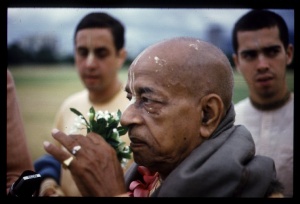SB 4.13.31: Difference between revisions
m (1 revision(s)) |
No edit summary |
||
| Line 1: | Line 1: | ||
{{info | {{info | ||
|speaker=priests engaged in the sacrifice of King | |speaker=priests engaged in the sacrifice of King Aṅga | ||
|listener=King | |listener=King Aṅga | ||
}} | }} | ||
[[Category:Srimad-Bhagavatam - Canto 04 Chapter 13]] | |||
[[Category:Bhagavatam Verses Spoken by the Priests Engaged in the Sacrifice of Anga Maharaja - Vanisource|041331]] | |||
<div style="float:left">'''[[Srimad-Bhagavatam]] - [[SB 4|Fourth Canto]] - [[SB 4.13: Description of the Descendants of Dhruva Maharaja|Chapter 13: Description of the Descendants of Dhruva Mahārāja]]'''</div> | |||
<div style="float:right">[[File:Go-previous.png|link=SB 4.13.30]] '''[[SB 4.13.30]] - [[SB 4.13.32]]''' [[File:Go-next.png|link=SB 4.13.32]]</div> | |||
{{RandomImage}} | |||
==== TEXT 31 ==== | ==== TEXT 31 ==== | ||
<div | <div class="verse"> | ||
sadasas-pataya ūcuḥ | :sadasas-pataya ūcuḥ | ||
nara-deveha bhavato | :nara-deveha bhavato | ||
nāghaṁ tāvan manāk sthitam | :nāghaṁ tāvan manāk sthitam | ||
asty ekaṁ prāktanam aghaṁ | :asty ekaṁ prāktanam aghaṁ | ||
yad ihedṛk tvam aprajaḥ | :yad ihedṛk tvam aprajaḥ | ||
</div> | </div> | ||
| Line 17: | Line 23: | ||
==== SYNONYMS ==== | ==== SYNONYMS ==== | ||
<div | <div class="synonyms"> | ||
sadasaḥ-patayaḥ | ''sadasaḥ-patayaḥ ūcuḥ''—the head priests said; ''nara-deva''—O King; ''iha''—in this life; ''bhavataḥ''—of you; ''na''—not; ''agham''—sinful activity; ''tāvat manāk''—even very slight; ''sthitam''—situated; ''asti''—there is; ''ekam''—one; ''prāktanam''—in the previous birth; ''agham''—sinful activity; ''yat''—by which; ''iha''—in this life; ''īdṛk''—like this; ''tvam''—you; ''aprajaḥ''—without any son. | ||
</div> | </div> | ||
| Line 24: | Line 30: | ||
==== TRANSLATION ==== | ==== TRANSLATION ==== | ||
<div | <div class="translation"> | ||
The head priests said: O King, in this life we do not find any sinful activity, even within your mind, so you are not in the least offensive. But we can see that in your previous life you performed sinful activities due to which, in spite of your having all qualifications, you have no son. | The head priests said: O King, in this life we do not find any sinful activity, even within your mind, so you are not in the least offensive. But we can see that in your previous life you performed sinful activities due to which, in spite of your having all qualifications, you have no son. | ||
</div> | </div> | ||
| Line 31: | Line 37: | ||
==== PURPORT ==== | ==== PURPORT ==== | ||
<div | <div class="purport"> | ||
The purpose of marrying is to beget a son, because a son is necessary to deliver his father and forefathers from any hellish conditional life in which they may be. Cāṇakya Paṇḍita therefore says, putra-hīnaṁ gṛhaṁ śūnyam: without a son, married life is simply abominable. King Aṅga was a very pious king in this life, but because of his previous sinful activity he could not get a son. It is concluded, therefore, that if a person does not get a son it is due to his past sinful life. | The purpose of marrying is to beget a son, because a son is necessary to deliver his father and forefathers from any hellish conditional life in which they may be. Cāṇakya Paṇḍita therefore says, ''putra-hīnaṁ gṛhaṁ śūnyam:'' without a son, married life is simply abominable. King Aṅga was a very pious king in this life, but because of his previous sinful activity he could not get a son. It is concluded, therefore, that if a person does not get a son it is due to his past sinful life. | ||
</div> | </div> | ||
__NOTOC__ | |||
<div style="float:right; clear:both;">[[File:Go-previous.png|link=SB 4.13.30]] '''[[SB 4.13.30]] - [[SB 4.13.32]]''' [[File:Go-next.png|link=SB 4.13.32]]</div> | |||
__NOTOC__ | |||
__NOEDITSECTION__ | |||
Revision as of 12:07, 16 May 2021

A.C. Bhaktivedanta Swami Prabhupada
TEXT 31
- sadasas-pataya ūcuḥ
- nara-deveha bhavato
- nāghaṁ tāvan manāk sthitam
- asty ekaṁ prāktanam aghaṁ
- yad ihedṛk tvam aprajaḥ
SYNONYMS
sadasaḥ-patayaḥ ūcuḥ—the head priests said; nara-deva—O King; iha—in this life; bhavataḥ—of you; na—not; agham—sinful activity; tāvat manāk—even very slight; sthitam—situated; asti—there is; ekam—one; prāktanam—in the previous birth; agham—sinful activity; yat—by which; iha—in this life; īdṛk—like this; tvam—you; aprajaḥ—without any son.
TRANSLATION
The head priests said: O King, in this life we do not find any sinful activity, even within your mind, so you are not in the least offensive. But we can see that in your previous life you performed sinful activities due to which, in spite of your having all qualifications, you have no son.
PURPORT
The purpose of marrying is to beget a son, because a son is necessary to deliver his father and forefathers from any hellish conditional life in which they may be. Cāṇakya Paṇḍita therefore says, putra-hīnaṁ gṛhaṁ śūnyam: without a son, married life is simply abominable. King Aṅga was a very pious king in this life, but because of his previous sinful activity he could not get a son. It is concluded, therefore, that if a person does not get a son it is due to his past sinful life.